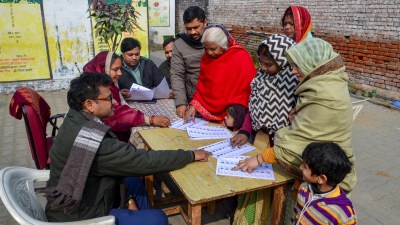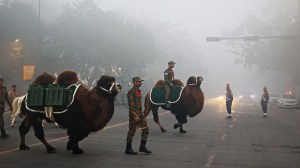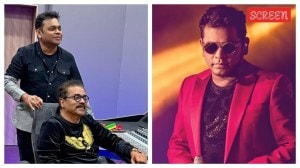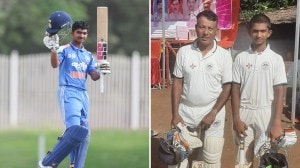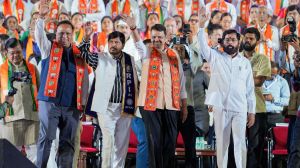GRADUATION BLUES
India is shining in junior hockey but what prevents the youth brigade from storming the senior league? Sudheendra Tripathi tries to bridge the gap

8226; Tushar Khandekar scored a hat-trick against Pakistan at the Junior Asia Cup final in Karachi in 2004. Similar displays at the senior level: Awaited.
8226; Between 1999 and 2005, Prabodh Tirkey played at practically every position on the field at the junior levels8212;scoring, leading a strong defence and earning stardom as a big-ticket player for the senior side. Similar displays at the senior level: Awaited.
8226; Titles at the Junior Asia Cup at Karachi 2004, Four-Nation Tournament in Malaysia in December 2004, Six-Nation Tournament in Poland in 2003 and then again in 2006. Similar displays at the senior level: Awaited, except the third place finish at the Sultan Azlan Shah meet in June.
THAT, in a nutshell, is the current story of Indian hockey8212;paper tigers at the senior level despite the presence of young turks who starred in numerous wins at the junior level.
Chief Coach V Baskaran stresses on the need to 8216;8216;nurture8217;8217;, but when the team management finetunes plans for the September World Cup in Germany, their predicament is clear: get the boys to grow up.
For, the Indian seniors may have grabbed a podium finish at the Sultan Azlan Shah meet in Malaysia recently, but the records for 2005-2006 are dismal: last at the Champions Trophy in Chennai December 2005, seventh at the Rabo Bank tournament in Holland before that and a humiliating loss to Pakistan at the home and away series later. In each case, the young stars of the junior side failed to excel.
8216;8216;Maybe, we draft the juniors into the senior side too early,8217;8217; admits Clarence Lobo, junior India coach. 8216;8216;Unless the youngster is exceptionally talented, he shouldn8217;t be given a place in the side, because it8217;s a totally different ball game at that level,8217;8217; he adds.
Australia were runners-up at the junior World Cup 2005, but not a single member of that side made it to the senior team formed for the Champions Trophy in December that year, Lobo points out. Obviously, the Australians, Olympic toppers, rely on experience and maturity8212;and not just on a few outstanding performances against players who haven8217;t turned 21 or completed even a couple of years on the international junior circuit.
Viren Rasquinha, India midfielder and one of the few juniors to have made the graduation successfully in the last few years, has an interesting take. 8216;8216;At the junior level, small mistakes are not severely punished by the opposition. But the senior sides of Australia, Holland, Germany, Argentina, Pakistan and South Korea will swoop down on the slightest let-up in defence and the match is lost in that split second,8217;8217; he says. Worse, a string of defeats alters the mindset of a junior star who has just joined the senior side. Morale dips dangerously and after that, the winning habit is almost impossible to revive, Rasquinha adds.
One of the youngest players of the senior side, who did not wish to be named, says the manner in which the game is played here is to be blamed, too. The style of play varies wildly, depending on the coach8217;s whims, from that taught at the club level or at the academies that hone talent. The Europeans, he adds, have a more streamlined system of managing styles and gameplans.
8216;8216;Whether it8217;s Germany or Holland, they follow a top-down system of style where, if the national side favours a certain attacking formation, that style is instilled even at the lowest levels, at the grassroots,8217;8217; he says, adding, 8216;8216;So, when they eventually make it to a national side, there8217;s no problem of acclimatisation.8217;8217;
However, Baskaran, who started his coaching career with the juniors in the mid-80s, says his scheme is to simply give youngsters space and time to grow and learn. 8216;8216;You have to nurture them and not impose anything on their style,8217;8217; he says from the World Cup camp in Bangalore.
Rasquinha also picks out a compromise mentality that creeps in among young players who are faced with 11 Australian seniors charging around. 8216;8216;Some may think a draw is good enough. We have to watch out for that, because it8217;s not as if we can8217;t beat Australia, it8217;s just about the mind,8217;8217; he says.
The Azlan Shah performance was heartwarming after a bleak 2005, but clearly, hockey lovers should not be getting their hopes too high in the run-up to the biggest stage. Because, before September 6, when the World Cup starts in Monchengladbach, this team needs to do some quick growing up.
Meanwhile, back-up in place for WC
IT seems that the Indian Hockey Federation IHF has come to terms with the growing demands of international hockey. After hiring a full-time physio Ravi Kanakamedala ahead of the December Champions Trophy in Chennai, former junior Australian International Derek Knox has been recruited as fitness director of the team.
8216;8216;Hockey is a demanding sport and you cannot do without a well-equipped support staff. We have made a few more requisitions to the federation and we are hopeful those will be fulfilled,8217;8217; India chief coach V Baskaran told The Indian Express.
Knox, who is on contract till the September World Cup, has already charted out a fitness regime that was put into effect from from Day One of the recently concluded Bangalore camp. Kanakamedala is expected to be with the team till the Doha Asian Games in December.
- 01
- 02
- 03
- 04
- 05


